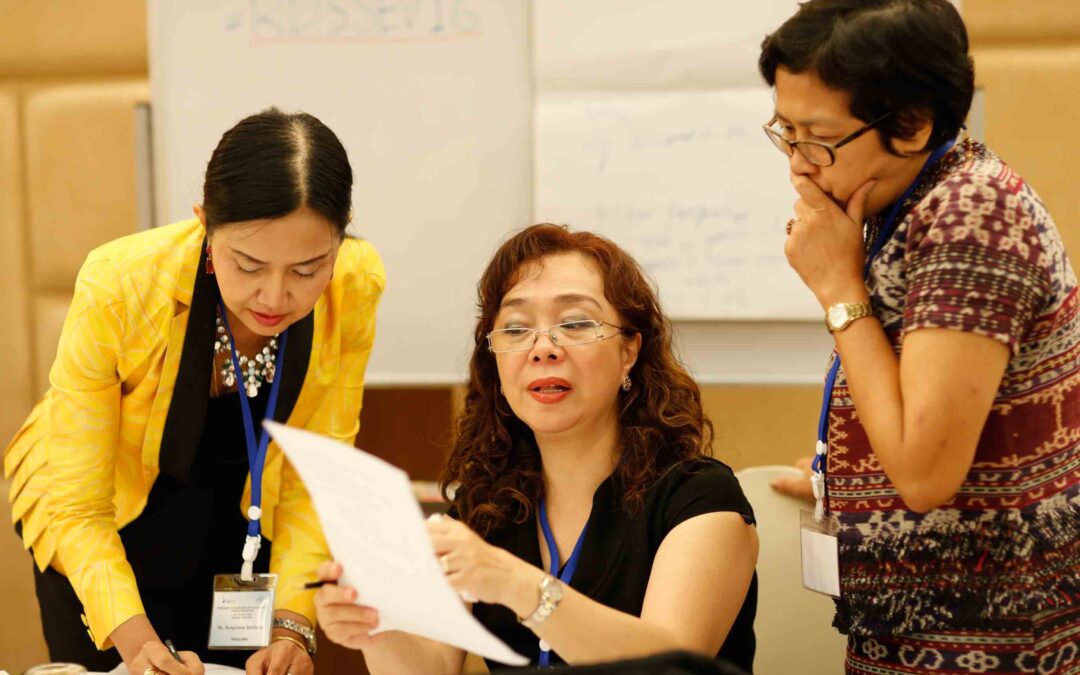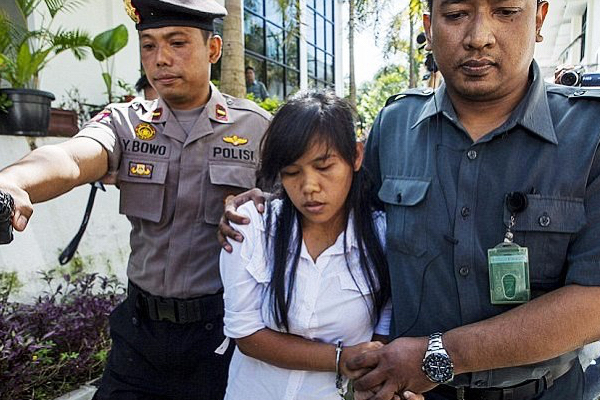
Jun 25, 2016 | Advocacy
The ICJ today published a General Guidance aimed at assisting judges and others in the justice sector to effectively incorporate a gender perspective in their work.
The General Guidance is especially significant as it reaffirms that customs and traditions should not be invoked to justify discrimination against women.
The Bangkok General Guidance for Judges in Applying a Gender Perspective was discussed and adopted by judges from Philippines, Thailand, Timor Leste, and Indonesia, at a gathering in Bangkok from 24 to 25 June 2016, hosted by the ICJ and UN Women.
During the workshop, judges from the four Southeast Asian countries deliberated extensively how best to assist judges in employing a gender perspective in deciding cases before them.
“The Bangkok General Guidance can make a powerful contribution towards achieving gender equality under the law in Southeast Asia,” said Sam Zarifi, Regional Director for Asia and the Pacific at the ICJ. “It is crucial that judges now work to implement this General Guidance in their home countries.”
The idea to initiate the development of th Bangkok General Guidance emerged from the ASEAN Regional Dialogue on Judging with a Gender Perspective, which was held in Jakarta, Indonesia in 2015.
The Supreme Court of the Philippines offered to take the lead on the project during that regional judicial dialogue.
“Women have a right to equal treatment and equal protection and non-discrimination under the law. It is our responsibility as judges to ensure that women receive equal treatment in law and in practice,” said Justice Teresita de Castro of the Supreme Court of the Philippines.
Judges attended several sessions over the course of the two-day workshop, participating in exercises focused on identifying and addressing gender stereotypes.
“Women in the region face many obstacles in accessing justice,” said Roberta Clarke, Regional Director for Asia and the Pacific at UN Women.
“But judges may be either unaware of these issues or unsure how to address these issues through the legal process,” she added.
The Bangkok General Guidance will make judges aware of means to consider evidence without resorting to gender stereotypes and decide cases based on the principle of equality recognized under international human rights standards, including the Convention on the Elimination of All Forms of Discrimination against Women (CEDAW).
Recommendations for institutional policies that should be adopted by courts to help them become more gender sensitive and gender responsive are also set out in the General Guidance.
Contact:
Emerlynne Gil, Senior International Legal Adviser for Southeast Asia, t: +66840923575 ; e: emerlynne.gil@icj.org
Southeast Asia-Bangkok-Guidance-Advocacy-2016-ENG (full PDF, in English)
Southeast Asia-Bangkok-Guidance-Advocacy-2016-BUR (full PDF, in Burmese)
Southeast Asia-Bangkok-Guidance-Advocacy-2016-MON (full PDF, in Mon language)
Southeast Asia-Bangkok-Guidance-Advocacy-2016-SHAN (full PDF, in Shan language)

May 13, 2016 | News
The ICJ and other human rights organizations condemn the imminent executions of Kho Jabing in Singapore and at least 15 individuals which apparently includes, 4 Chinese nationals, 2 Nigerians, 2 Zimbabweans, 1 Senegalese, 1 Pakistani and 5 Indonesian nationals in Indonesia.
The organizations call on the authorities of the two countries to halt the impending executions.
On 12 May 2016, the family of Kho Jabing, a Malaysian national on death row in Singapore, received a letter from the Singapore Prisons informing them that he would be executed on 20 May 2016. Kho Jabing was convicted of murder in 2011.
Of particular concern is the fact that there was a lack of unanimity in sentencing Kho Jabing to death, which demonstrates that reasonable doubt exists as to whether he deserved the death penalty.
As regards the imminent executions that will be taking place in Indonesia, Indonesia would contravene her own international obligations under the International Covenant on Civil and Political Right by executing these individuals.
The Association of South East Asian Nations Member States (“ASEAN”), including Singapore and Indonesia, have continuously emphasized the importance of the rule of law and the protection of rights.
The death penalty therefore stands out as an aberration.
In December 2014, the United Nations General Assembly adopted its latest resolutions calling on all States to adopt a moratorium on the use of the death penalty, with a view towards abolition.
A record number of 117 Member States supported the Resolution.
Regrettably, Indonesia abstained and Singapore voted against the Resolution.
The ASEAN Member States must use the opportunity presented by this Resolution to align themselves with the global movement towards abolition.
Singapore has recently undergone its second Universal Periodic Review in January 2016.
The continued use of the death penalty was one of the key highlights of the review, with Singapore receiving over 30 recommendations related to the death penalty, including recommendations to abolish the death penalty.
In 2015, Indonesia, a United Nations Human Rights Council Member until 2017, executed 14 individuals convicted of drug-related offences amid strong international opposition.
The imminent executions would further damage Indonesia’s human rights record and erode her standing in the international community.
The death penalty has no place in the 21st Century.
Not only is there a real possibility of wrongful executions, it deprives inmates of their life and dignity, and creates new classes of victims.
We strongly urge the governments of Singapore and Indonesia to halt the upcoming executions, immediately impose a moratorium on the use of the death penalty and take meaningful steps towards its eventual abolition.
List of signatories:
Anti-Death Penalty Network Asia (ADPAN)
Center for Prisoner’s Rights Japan (CPR)
Community Action Network (CAN, Singapore)
Free Community Church (Singapore)
Function 8 (Singapore)
MADPET (Malaysians Against Death Penalty and Torture)
Maruah (Singapore)
International Commission of Jurists (ICJ)
Journey of Hope
Legal Aid Community (LBH Masyarakat, Indonesia)
Murder Victims’ Families for Human Rights (MVFHR)
Ocean
Pusat Studi Hukum dan Kebijakan Indonesia (The Indonesian Center for Law and Policy Studies)
Reprieve Australia
Sayoni (Singapore)
Singapore Anti-Death Penalty Campaign (SADPC)
Suara Rakyat Malaysia (SUARAM)
Taiwan Alliance to End the Death Penalty (TAEDP)
The Commission for the Disappeared and Victims of Violence (KontraS, Indonesia)
The Indonesian Center for Law and Policy Studies (PSHK, Indonesia)
The Institute for Criminal Justice Reform (ICJR, Indonesia)
The Institute for Policy Research and Advocacy of Indonesia (ELSAM)
The National Human Rights Society, Malaysia (HAKAM)
Think Centre Singapore
We Believe in Second Chances (WBSC, Singapore)
Contact:
Sam Zarifi, ICJ Asia-Pacific Director, t: +66-807-819-002; e: sam.zarifi(a)icj.org

Mar 17, 2016 | News
The Indonesian House of Representatives should reject proposed amendments to the country’s Anti Terrorism Law that would actually contravene international law, said the ICJ and other human rights groups today.
“The horrific recent attacks in Jakarta highlight the Indonesian government’s obligation to protect people from acts of terrorism, but experience from around the world has shown that countering terrorism must occur along with protection of human rights, not in violation of Indonesia’s legal obligations,” said Sam Zarifi, ICJ’s Regional Director for Asia and the Pacific.
The ICJ, the Commission for the Disappeared and Victims of Violence (KontraS), and the Indonesian Human Rights Monitor (IMPARSIAL) noted that the proposed amendments would authorize unnecessarily prolonged detention of suspects, putting them at risk of torture, ill-treatment, enforced disappearance, and arbitrary detention.
The amendments also include a provision on administrative detention.
“This is generally forbidden in international law, save in the most exceptional circumstances far narrower than as contemplated under the amendments,” Zarifi added.
A letter sent by the organizations to the House of Representatives lays out recommendations on how this provision may be revised so that it would not violate the rights of detainees.
“There is no reference anywhere in the amendments how detainees may challenge the lawfulness of their detention. It has to be clear in the law that these remedies are available to them,” said Haris Azhar, National Executive Coordinator of KontraS.
The three organizations also underline the amendment proposing stripping Indonesian combatants abroad of their nationality would be contrary to international law, if this would render them stateless.
“Nationality is what legally binds an individual to a particular State. It is an essential prerequisite to the enjoyment and protection of the full range of human rights,” said Poengky Indarti, board member of IMPARSIAL.
They also said that the proposed provision on incitement to terrorism would unduly limit political speech, especially those that are contrary to the views of persons wielding power and authority, such as opinions on self-determination or changes to the legal and constitutional structures.
The proposed amendments impose the death penalty on particular offences.
The ICJ, IMPARSIAL, and KontraS oppose capital punishment in all cases without exception, as it is a violation of the right to life and the right not to be subjected to cruel, inhuman, and degrading treatment.
In the letter, they remind the government of Indonesia to immediately impose a moratorium on the use of the death penalty, with a view to moving towards its total abolition.
The ICJ, IMPARSIAL, and KontraS urged the members of Indonesia’s House of Representatives to keep in mind that whatever measures Indonesia uses to counter terrorism must comply with international law and protect human rights.
Contact:
Emerlynne Gil, ICJ’s Senior International Legal Adviser (Bangkok), t: +66 840923575 ; e: emerlynne.gil(a)icj.org
Fatia Maulidiyanti, S.IP, International Desk of KontraS (Jakarta), t: +62 21 391 9097/98 ; e: fatia(a)kontras.org
Poengky Indarti, Member of the Board of IMPARSIAL (Jakarta), t: +62 812 8362 8659 ; e: poengky1970(a)gmail.com
Indonesia-Letter to Gvt-Advocacy-Open letters-2016-ENG (full text of letter, in PDF)

Jan 20, 2016 | News
The Indonesian government’s efforts to counter and punish attacks such as the deadly assault in central Jakarta last week can only succeed if they strengthen respect for rights and rule of law, said the ICJ today.
Indonesia’s National Counterterrorism Agency (BNPT) and the State Intelligence Agency (BIN) claimed that they lacked sufficient authority under the country’s existing Anti-Terrorism Law to stop the attacks.
Eight people were killed in an attack by armed men in central Jakarta on 14 January.
“Plans discussed by Indonesian authorities to amend the 2003 Anti-Terrorism Law to make it ‘more effective’ in addressing terrorist threats mostly focus on weakening hard-won protections for suspects and the rule of law,” said Emerlynne Gil, ICJ’s Senior Legal Adviser for Southeast Asia.
“In order to help the Indonesian government meet its obligation to protect its people from acts of terrorism, experience from around the world and Indonesia’s Suharto era shows that security can only be achieved through justice,” she added.
The head of the National Police, Gen. Badrodin Haiti, said that the Anti-Terrorism Law prevents police from prosecuting Indonesians returning home after allegedly serving as combatants in Syria.
One of the proposals is to give intelligence officers the authority to make arrests under the Anti-Terrorism Law.
“Giving intelligence officers the authority to make arrests will likely lead to an increase in violations of human rights,” said Gil.
“The roles of intelligence and of law enforcement are fundamentally different and need to remain separate,” she added.
The ICJ pointed out that there were not enough safeguards under Indonesia’s laws, specifically the State Intelligence Law, to ensure the accountability of the intelligence agency or its officers.
Another proposal is that authorities be given the power to arrest anyone they see as having a “strong indication” to be planning acts of terrorism.
The ICJ, however, observes that this proposal appears to allow Indonesian authorities to avoid judicial oversight so that it would be easier for them to arrest any person, irrespective of whether there is sufficient evidence of criminal activity or an intent to prosecute.
This proposal also appears to allow authorities to detain and interrogate persons suspected of involvement in terrorist acts with a view to gaining intelligence information without necessarily contemplating the filing of criminal charges.
As ICJ’s Eminent Jurists Panel on Terrorism, Counter-terrorism, and Human Rights has underscored, the practice of arrest and detention for the sole purpose of intelligence gathering may mean the arrest and detention of those “who are not necessarily criminal suspects, but who are also believed to have information that will ‘substantially’ assist the collection of intelligence relating to terrorism.” Detaining people for the sole purpose of intelligence gathering in the absence of evidence of criminal activities is a form of arbitrary detention.
Such a practice can also lead to secret or unacknowledged detention, which under international law constitutes enforced disappearance and is absolutely prohibited, the Geneva-based organization adds.
“The obligation to protect human rights and keep people safe from acts of terrorism are not at opposing poles,” said Gil. “They are complimentary and mutually reinforcing duties of protection incumbent on the State.”
“In fact, protecting human rights can be an effective shield in defending societies from acts of terrorism,” she added.
All measures to counter terrorism must strictly comply with obligations Indonesia has under international law.
Contact:
Emerlynne Gil, Senior International Legal Adviser of ICJ for Southeast Asia, t: +66 840923575 ; e: emerlynne.gil@icj.org
Background:
Indonesia’s Anti-Terrorism Law requires judicial approval to arrest a suspect in a terrorism case. Under the law, authorities may arrest any person “strongly suspected of committing a crime of terrorism on the basis of sufficient initial evidence.”
The Chairperson or Deputy Chairperson of a District Court determines whether sufficient initial evidence exists or has been obtained by authorities.
Under article 42 of Indonesia’s State Intelligence Law, the accountability of intelligence operations of the State Intelligence Agency is in principle ensured through a written report on these operations submitted to the President of Indonesia.
This provision has been criticized for failing to provide sufficient accountability, as the presidency is firmly within the Executive branch and lacks capacity to investigate and prosecute in the ordinary criminal justice system.
Furthermore, article 24 of the State Intelligence Law provides that the State has the obligation to give “protection” to all intelligence personnel when carrying out their intelligence duties and functions. Such protection is extended to their family members.
The law does not define “protection” and hence may be construed as the State being obliged to grant immunity to intelligence personnel and their family members from criminal prosecution or civil liability.

May 19, 2015 | News
In a letter sent this week, the ICJ urged President Joko Widodo to grant Mary Jane Veloso, a Filipino national on death row in Indonesia, a permanent reprieve from execution and to impose a moratorium on executions, with a view of abolishing death penalty in the near future.









